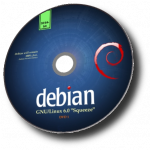This is my monthly summary of my Debian related activities. If you’re among the people who made a donation to support my work, then you can learn how I spent your money. Otherwise it’s just an interesting status update on my various projects.

I have been…
Doing some work towards Debian Rolling
At the start of the month, the discussions about Debian rolling were still very active on debian-devel. Declaring that testing would be rolling did not make it (as I hoped), the argument that some RC bugs last for far too long in that distribution carried the discussion and thus the most consensual proposition ended up being the one of Josselin Mouette were rolling would be testing plus a few selected cherry-picked packages from unstable.
I believe it’s a workable solution if we only care about a subset of architectures. Otherwise the same reasons that keep the fixed packages out of testing would probably also apply for rolling.
Given this, I did setup britney (the software that controls testing) on my laptop to investigate how we can create rolling. It turns out britney is a very specialized software with very few configuration knobs.
At the same time Joachim Breitner made a proposition that immediately grabbed my attention. He suggests to use SAT solvers to find out the set of packages that should migrate from unstable to testing. I thought that rolling would be a good testbed for this new implementation of britney (which he calls SAT-britney) so I jumped right in this project.
I was not at all familiar with this science field, so I looked up quite some documentation: I learned that all SAT solvers expect the problem to be presented in CNF form, and that DIMACS was the file format of choice to represent those boolean constraints. Several SAT solvers are available in Debian and picosat appears to be one of the best.
Then I started some early coding/prototyping to play with the concept. You can find the result in this git repository, you can grab a copy with git clone git://git.debian.org/~hertzog/sat-britney.git.
There’s not much yet, except some Python code to generate a SAT problem that can be fed to a SAT solver. But I really look forward to this project.
Representing Debian during Solutions Linux
During the second week, I spent 3 days in Paris to help manage the Debian booth at Solutions Linux.
We have responded to lots of queries but most visitors already knew Debian, and many of them use it at work and/or at home. We tried to recruit those people as new members for Debian France, the local association. We also sold all our remaining goodies.
The Ubuntu people were interviewed by France 3 (an important TV channel) and we took this opportunity (with the consent of the Ubuntu guys) to show our Debian t-shirts in the background: you can watch the video here (in French), you can see me with Carl Chenet at 1:21.
We have also been interviewed by Intelli’n TV: here and here (both in French). I’m not very good at this exercise. 🙂
Improving dpkg triggers
The third week was a vacation week, in theory I should have stayed away from my computer but I really wanted to take this opportunity to improve the state of dpkg triggers in Debian.
I already covered my work in another article: Trying to make dpkg triggers more useful and less painful.
The result is not merged yet, I just asked a question to all package maintainers who are using triggers to be able to decide whether I’ll merge it as is, or if I can make the new behavior the default one.
Supporting users after Alioth’s migration
When I came back from my vacation, many services provided by Alioth.debian.org were non-functional after a migration to a new setup that involves two machines instead of one. Given that I used to be an Alioth admin, I know that in those periods you tend to be get bogged down on many user support requests. So I re-joined #alioth on IRC and tried to help a bit.
I did investigate some of the reported problems and prepared fixes (updated scripts, configuration files, etc.) for some of the issues. I also created a list of remaining issues that should have lasted only a few days but that’s still active because there are still regressions left.
The most important things still missing are:
- proper support for delegation of rights. We used ACL setup by the admins in the past. With the new FusionForge, each project admin should be able to delegate rights to external “roles”. There’s a Debian Developer role already but trying to grant him right fails…
- access to the Ultimate Debian Database. Many tools rely on this database to work.
- anonymous FTP access to download project files.
- clear guidelines on how we’re supposed to deal with websites that are updated by VCS hooks.
- clear guidelines on how we’re supposed to deal with personal git repositories
Improving the “3.0 (quilt)” source format
I have made some proposals to change the way the new source format would work. The goals are to be less painful for packagers who are using a VCS, and to avoid unexpected changes slipping through a new patch generated by dpkg-source.
It seems that the proposals are relatively consensual so I’ll implement them at some point.
Missing in action on my blog
I did a lots of stuff for Debian between travel and vacation, and in the remaining time, I did not manage to write many articles for my blog.
In fact, besides the article on my triggers work mentioned above I only published one interview: People behind Debian: Steve Langasek, release wizard.
I’ll try to do better this month!
Thanks
Many thanks to the people who gave me 151.61 € in May.
See you next month for a new summary of my activities.

